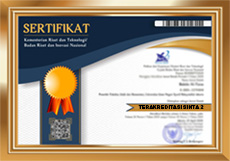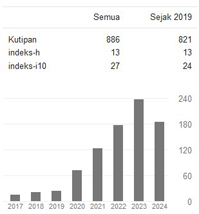Ekonomi Politik, Internet, dan Demokrasi
Abstract
This article aims to explain the political economy of the Internet and its relevance to democracy. This
elaboration is an alternative to the utopian and dystopian techno-determinist approaches in viewing the relationship
between the Internet and democracy. From a political economy perspective, the Internet and its various derivatives,
such as search engines, social media, e-commerce, and other platforms, are not only networks and communication
platforms, but also instruments of commodification, surveillance, and control by global digital companies that based
in the United States of America to millions of users around the world. From the results of the literature study and
conceptual analysis of the processes of commodification, surveillance, and control, the authors conclude that claims
about the democratic characteristics of the Internet are ideological in nature. The claim hides the economic and
political interests of the United States and its global digital companies. What the United States and these global
digital companies have done has stripped away basic democratic values, such as respect for and protection of
human rights, freedom, and equality. From that conclusion, the authors suggest the need for openness and
multilateral globalism in Internet governance so that it is more friendly towards democratic values.
Key words: Commodification, democracy, Internet, political economy, surveillance
Full Text:
PDFReferences
Annur, Cindy Mutia. “Jumlah Pengguna Internet Global Tembus 5 Miliar Orang pada Oktober 2022.” Katadata.co.id, 23/11/2022. Dalam https://databoks.katadata.co.id/datapublish/2022/11/23/jumlah-pengguna-internet-global-tembus-5-miliar-orang-pada-oktober-2022, diakses 26 November 2022.
Armando, Ade. Televisi Indonesia di Bawah Kapitalisme Global. Jakarta: Penerbit Buku Kompas, 2016.
Braverman, Harry. Labor and Monopoly Capital – The Degradation of Work in the Twentieth Century. New York: Monthly Review Press, 1974.
Burighel, Micol. “Polarization and the Role of Digital Media”. Prosiding Seminar. https://nome.unak.is/wordpress/volumen-14-no-2-2019/conference-proceedings-volume-14-no-2-2019/polarization-and-the-role-of-digital-media/, diakses 01 Oktober 2022.
Daven, Matias. “Epistemologi” (ms.). Maumere: STFK Ledalero, 2015.
Eatwell, John, Murray Milgate, dan Peter Newman. The New Palgrave: A Dictionary of Economics. London: Macmillan, 1987.
Foster, John B. Ecology against Capitalism. New York: Monthly Review Press, 2002.
Fuchs, Christian. Social Media: a critical introduction. London, Los Angels, New Delhi, Singapore, dan Wasington DC: Sage Publications Ltd., 2014.
-----------. Social Media: a critical introduction. Second edition. London, Los Angels, New Delhi, Singapore, dan Wasington DC: Sage Publications Ltd., 2017.
Haraway, Donna. The Haraway Reader. London: Routledge, 2003.
Heywood, Andrew. Politik Global. Edisi kedua. Yogyakarta: Pustaka Pelajar, 2017.
Laniuk, Yevhen. “Freedon in the Age of Surveillance Capitalism: Lessons from Shoshana Zuboff.” Etics & Bioetics (in Europe), 11(1-2), 2021, 67-81. DOI:10.2478/ebce-2021-0004.
Latour, Bruno. Reassembling the Social. Oxford: Oxford University Press. 2005.
Lim, Merlyna. @crossroads: Democratization & Corporatization of Media in Indonesia. Published jointly by Participatory Media Laba at Arizona State University and Fordfoundation, 2011.
Mosco, Vincent. The Political Economy of Communication. Second edition. London, Los Angels, New Delhi, Singapore, dan Wasington DC: Sage Publications Ltd., 2009.
-----------. “Marx in the Cloud”. Dalam Christian Fuchs & Vincent Mosco (eds.). Marx in the Age of Digital Capitalism, Studies in Critical Social Science. Leiden & Boston: Brill, 2015.
Mueller, M. L. Networks and States: The global politics of Internet Governance. Cambridge, MA: MIT Press, 2010.
Noelle-Neumann, Elisabeth. The Spiral of Silence: Public Opinion - Our Social Skin. University of Chicago Press, 1989.
Paragas, Fernando de la Cruz dan Trisha TC Lin. “Organizing and Reframing Technological Determinism.” New Media & Society, Vol. 18, No. 8, 2016, 1528-1546. DOI: 10.1177/1461444814562156.
Schiller, Dan. “Rosa Luxemburg’s Internet? For a Political Economy of State Mobilization and the Movement of Accumulation in Cybercspace.” International Journal of Communication, 8, 2014, 355-375.
Smythe, Dallas. “Communications: Blindspot of the Western Marxism.” Canadian Journal of the Political and Social Theory, 1 (3), 1977.
Steuart, James. An Inquiry in the Principles of Political Economy. Second editon. New York: Augustus M. Kelley, 1967.
Sudibyo, Agus. Jagat Digital – Pembebasan dan Penguasaan. Cetakan ke-2. Jakarta: Kepustakaan Populer Gramedia (KPG), 2021.
Sunstein, C. #republic. Divided Democracy in the Age of Social Media. Princeton: Princeton University Press, 2017.
Tapsell, Ross. Media Power in Indonesia – Oligarch, Citizens, and the Digital Revolution. London: Rowman & Lilttlefield International Ltd., 2017.
van Dijk, Jan A.G.M. “Digital Democracy: Vision and Reality. To be Published in I Snellen & W. van de Donk.” Public Administration in the Information Age: Revisited, IOS-Press, 2013. (Artikel ini sebelumnya diterbitkan di Jurnal Innovation and the Public Sector, Vol. 19, No. 1, 2012.)
Wyatt, Sally. “Technological Determinism is dead; Long Live Technology Determinism”. Dalam Robert C. Scharf dan Dusek (eds,). Philosophy of Technology – The Technological Condition, An Antology. Second edition. EK: John Wiley & Sons. Inc, 2014.
Zuboff, Shoshana. “The Secret of Surveillance Capitalism.” http://www.faz.net/aktuell/feuilleton/debatten/the-digital-debate/shoshana-zuboff-secretsof-surveillance-capitalism-14103616.html?printPagedArticle=true#pageIndex_2, 2016, diakses pada 05/12/2022.
-----------. The age of Surveillance Capitalism – The Fight for a Human Future at the New Frontier of Power. New York: Public Affairs, 2019.
DOI: http://dx.doi.org/10.31385/jl.v22i1.333.20-38
Refbacks
- There are currently no refbacks.

This work is licensed under a Creative Commons Attribution-NonCommercial-ShareAlike 4.0 International License.

Copyright© 2015 JURNAL LEDALERO This work is licensed under a Creative Commons Attribution-NonCommercial-ShareAlike 4.0 International License.
Institut Filsafat dan Teknologi Kreatif Ledalero Jalan Trans Maumere-Ende - Sikka - Flores - Nusa Tenggara Timur - Indonesia Telp/Fax: 0382 2426535










